Shopify Vs Swell Comparison: Which e-commerce platform should you choose?
If you are starting a new online e-commerce store for your brand - should you choose Shopify? Or should you go with a newer competitor like Swell Ecommerce? Which option is better for your business? It is hard to find out the answer just by looking at Shopify or Swell's website - as there are so many different attributes to compare before you make a decision.
The answer between Shopify vs Swell, is that it depends. For majority of businesses that just quickly wants to setup an online e-commerce store, they should go with Shopify. Also, if you dont have access to a development team, then definitely go with Shopify, as you can take your store live without knowing how to code.
But if you need a totally custom e-commerce platform AND you have access to good developers, then the answer becomes more difficult. Do you need more customizations on your checkout pages - then go with Swell? Do you need better reporting and analytics - then the winner is Shopify? If you are interested in a headless e-commerce platform, you can choose between Shopify Plus or Swell. So, the answer to Shopify vs Swell really depends on what your custom needs are, and if you have developer resources.
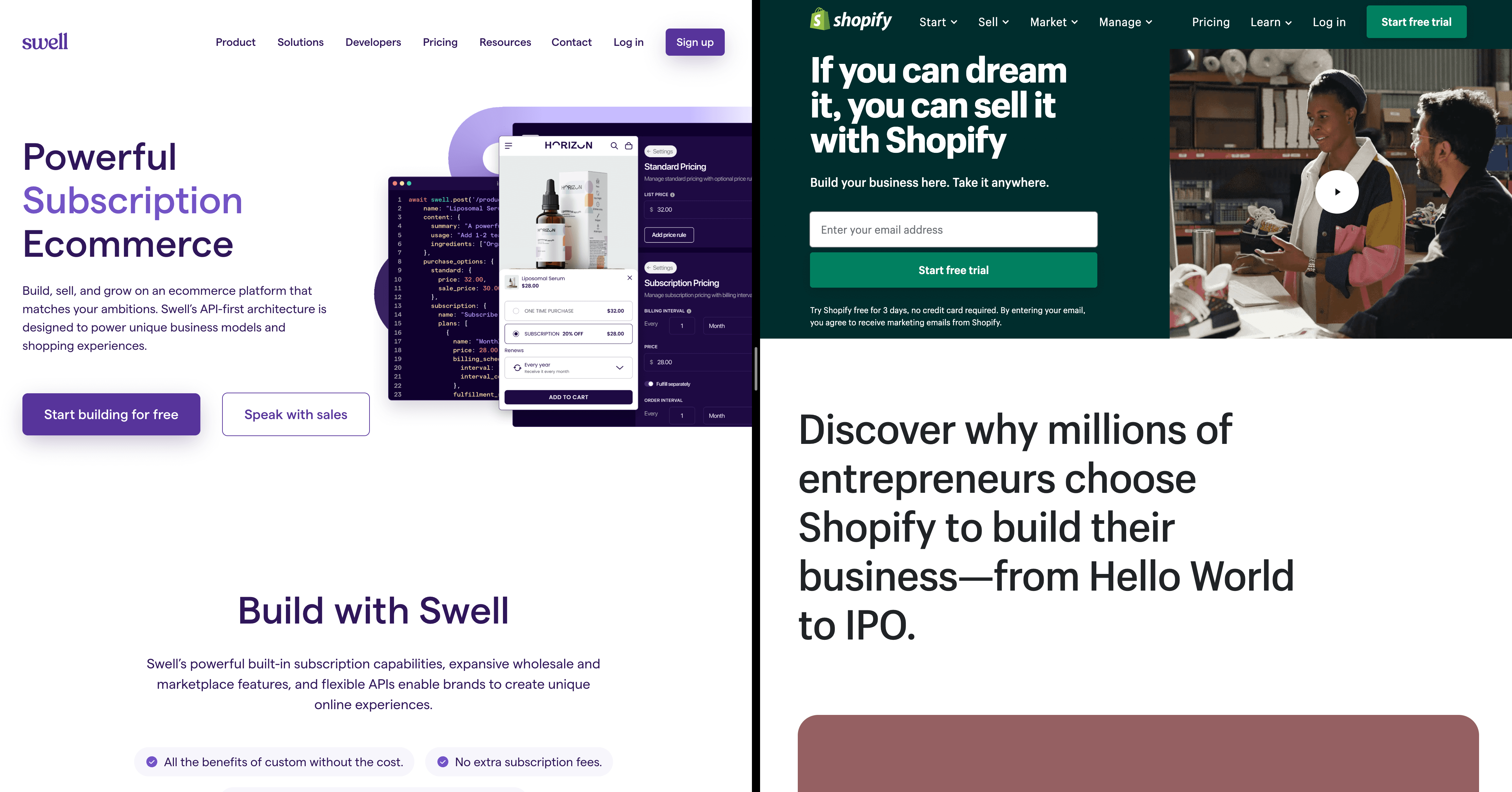
In this article, we will look at the benefits and negatives for both Shopify and Swell, so that you can decide for yourself which is better specific to your needs.
Shopify vs Swell Feature Comparison
| Feature | Winner |
|---|---|
| Analytics & Reports Which has better reporting? Reports on top customers, best selling products etc |
Shopify |
| Standard APIs The more APIs, the more customizations possible on your store |
Shopify |
| Better for someone starting out? If you want to quickly get your store up and running? |
Shopify |
| Better for an established business? Which is better for a business that is already established and selling online? |
Shopify |
| Customizations on key pages Example customizing the checkout page? |
Swell |
| Blogs Which has a better blogging platform? |
Shopify |
| Community Which has a better support community, forums? |
Shopify |
| Integrations Which platoform makes it easier to integrate with third party apps like Quickbooks, Facebook etc |
Shopify |
| Market place Which has a better market place for adding plugins/apps? |
Shopify |
What is Shopify
Shopify is one of the easiest ways to setup an online store to sell something online. During Covid, Shopify grew tremendously to become the number one player in the e-commerce space. Because of covid and lockdowns, most of the physical retailers had to shut down and instead move online and many of them started using Shopify this way. And, when most of the stores reopened after Covid, they also started using Shopify for their physical point of sale transactions as well. For e.g. Brunt Workwear is an e-commerce store the sells clothes for workers. They started using Shopify in 2020 and today in 2022 they have a run rate of 50 million dollars and a growing at over 200% and sells over 40,000 boots per month. Slinger, a new sports brand focused on delivering innovative game improvement technologies and equipment for the global tennis market started using Shopify is this year in 2022 - and within four months of using Shopify Plus, Slinger saw a 43.5 % increase in revenue, a 20% increase in conversion and a 20% increase in website traffic without doing any new marketing. The main advantage of using Shopify is that they have built all the systems you need to create a successful store online - saving you time which you could be spending on marketing your product
What is Swell: Is Swell a good brand?
Swell Ecommerce is a headless e-commerce platform that allows you build a totally customer e-commerce store for your brand. Although Shopify is the giant in this space, there are few good differentiators with Swell, that you should consider before committing to a platform.
Swell sells itself mainly as a headless platform - that is disconnecting the front-end - the store front (what your customers see), from the back-end (where all the data lives) - which allows you to build more custom solutions according to your needs. Basically they give you a really well built, configurable backend for your store - and allow you to build the front-end in anyway you choose.
Shopify vs Swell comparison
The most important differences between Shopify and Swell
Online many blogs say that the big difference between Shopify and Swell, is that with Swell being headless it allows you to have more customizations - whereas Shopify is largely not customisable - and if you need more than what is offered out of the box, it can quickly get more expensive. While I agree with Shopify largely not being headless, they do have Shopify Plus, which is headless, and allows for more customization.
But more than the headless e-commerce platform debate between Shopify and Swell, I found a few other notable differences between the two.
Swell builds all of their features in-house. Shopify gives you 75% of what you need to build a successful store - and for the remaining 25% you need to use a third-party app. This is a huge difference with Swell and Shopify. Swell does not have an app store - although they have a really good platform - but if you require further features, you will need a developer to build them for you. You cannot just choose an app like you would do with Shopify. So, unless you have access to a good set of developers, building more features on your Swell ecommerce store can be hard. But if you already have a good dev team, then it is easier to customize with Swell.
With Shopify, you cannot customize a lot of things. For example, the checkout page is impossible to customize on the basic plan. However, on Swell, you can fully customize the checkout page and make it exactly to your needs.
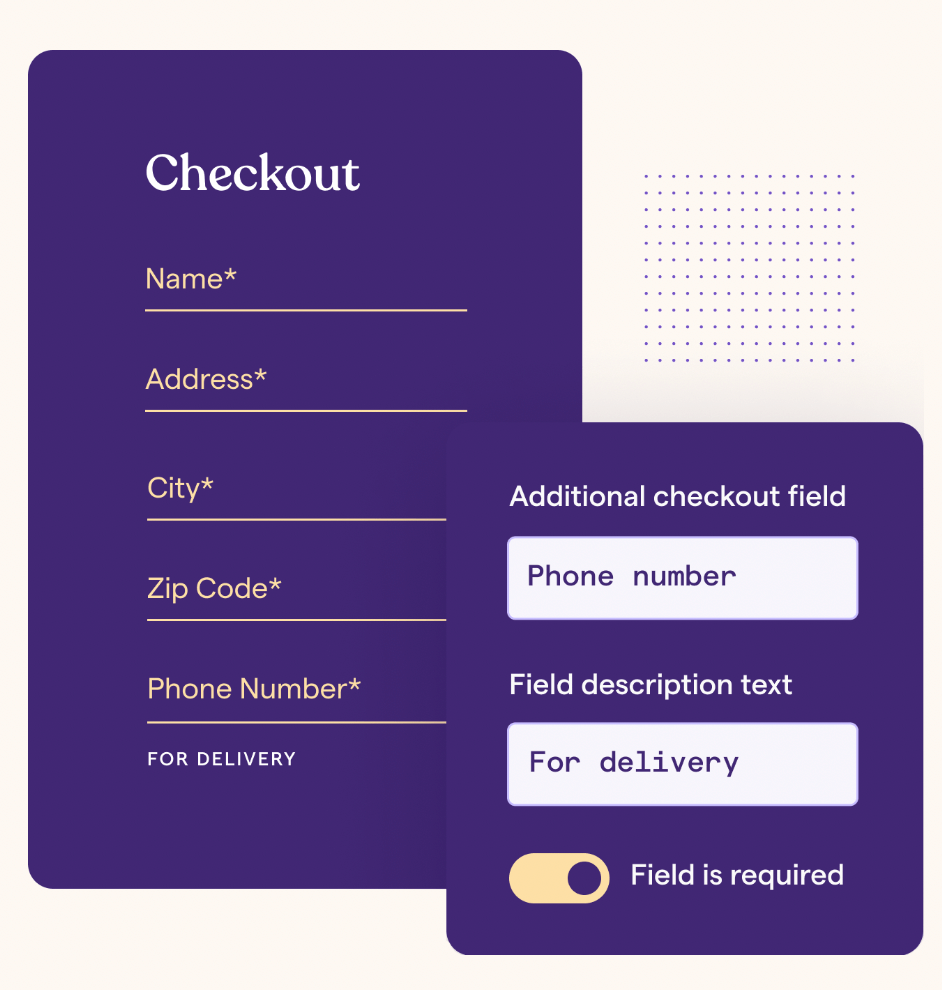
Things you can do on Shopify better than Swell?
- Integrations: While Swell is improving on the integrations they provide, it is unmatched with Shopify. Because of Shopify's app store, there is an integration with almost every app you will need, compared to Swell which has only around 15-20 integrations.
- Faster to setup and sell: While the argument could be made that Swell provides more customizations with their headless platform - for most e-commerce stores, they dont need to customize outside of what Shopify provides out of the box. Especially, if you are new store, and you want to quickly get up and running, then Shopify is the way to go.
- Better community: Because Shopify has been around for much longer than Swell, they have a bigger community and better support system. Most of your questions will be answered within 24 hours - and more importantly if you search the community, you will get answers from others who have faced the same problem in the past.
- Better reports: Shopify has good reports - but they also allow you to create custom reports via their app, or with a third-party plugin. With Swell, you are limited to the reports they provide.
Disadvantages of Swell while comparing with Shopify
- App Store: With Shopify, you have access to a large market place, a better community. There are more plugins, apps on the app store. For marketing, or for improving conversions, there are tons of apps specifically designed to help improve conversions. Shopify has the largest third party app store in the e-commerce space. With Swell, if the feature you want is not provided by Swell, you will need to hire a developer to build it out for you.
- Analytics: While Swell has good reports, I felt like Shopify provides a better overview of the analytics. They have more in-depth reports, plus other live analytics features which I found missing at Swell.
Things you can do on Swell better than Shopify?
- Custom hosted checkout or build your own checkout: With Shopify you can change the colours or choose a new font for the checkout pages. That is it. With Swell, you have so much more flexibility out of the box. You can build the checkout pages to look like exactly what you want.
- Built-in subscriptions (with any gateway): If you need to provide subscriptions on Shopify, you have to use third-party apps. Some of these apps are really good and there are thousands of stores using them everyday. However, the fact is that it is not provided out of the box. With Swell, subscriptions are built in.
Disadvantages of Shopify when comparing with Swell
In this section we are only looking at the disadvantages of Shopify when comparing to Swell.
- With Shopify, you don't have full control of your store's front-end. They take care of the backend - customers, reports, orders, products - and you are limited to what you can do in the front-end. You do have control on how a product or collection page should look like - but you cannot change the URL structure completely. For example the product pages are always in this format for their URLs : /products/product-item. Suppose you want to change this URL structure from what it is to your-brand.com/product-item, it is not possible with Shopify. But I should highlight that this is not a really big drawback.

2. Limited flexibility with design on certain important pages: Unless you are on Shopify Plus, you are limited to what you can customize on certain pages. For example, this is how the checkout page for Shopify looks like out of the box.
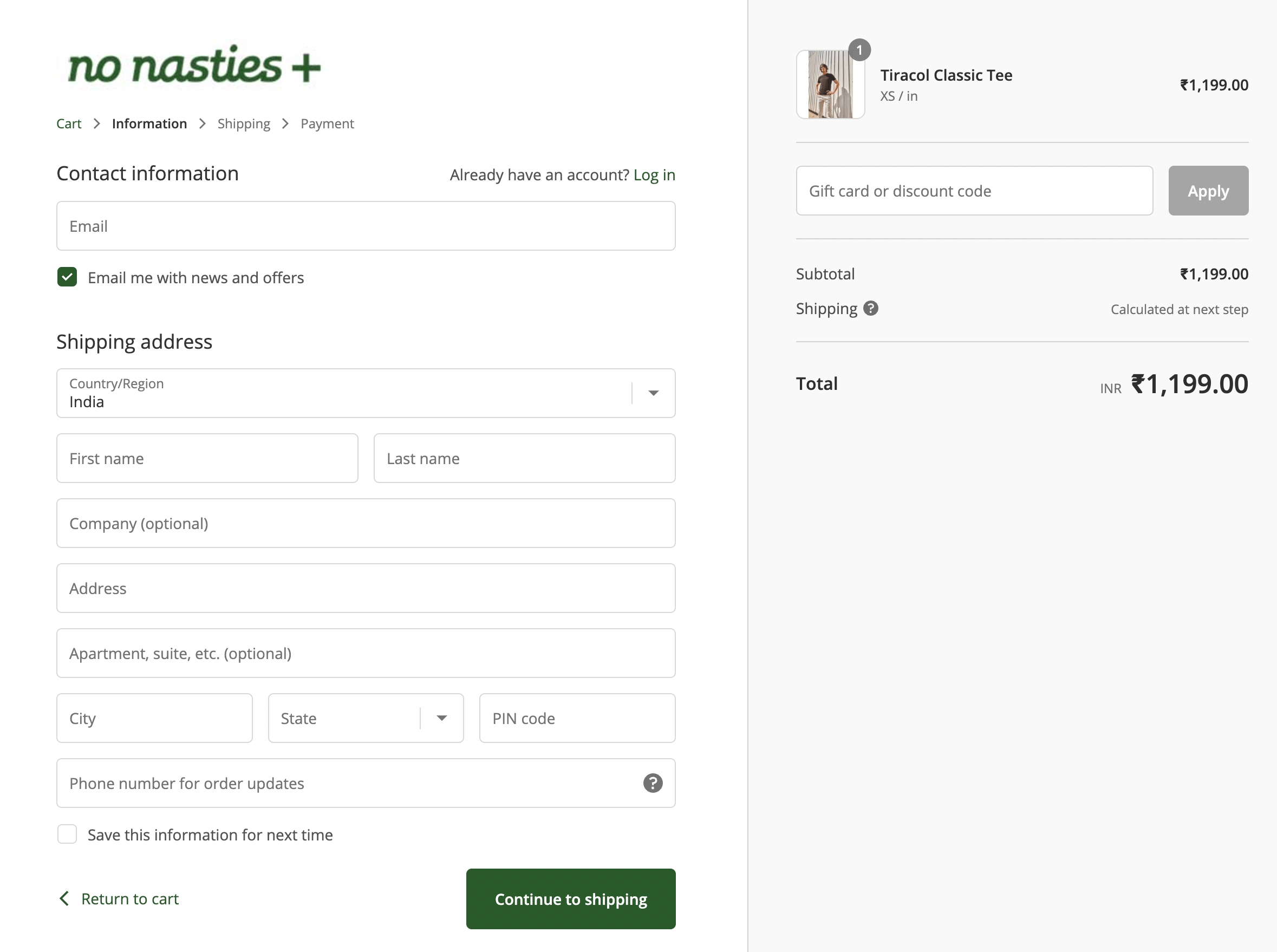
Shopify allows you to add your company logo, change the colors, or choose a new font to make the checkout match your business. That's it. There are third party apps you can use to nudge customers to buy more, but you dont have much more flexibility on the checkout page. This is not really a problem unless you have a really specific use-case and you want to customize the design of this page.
Shopify vs Swell Costs - Which is more expensive?
Shopify Pricing
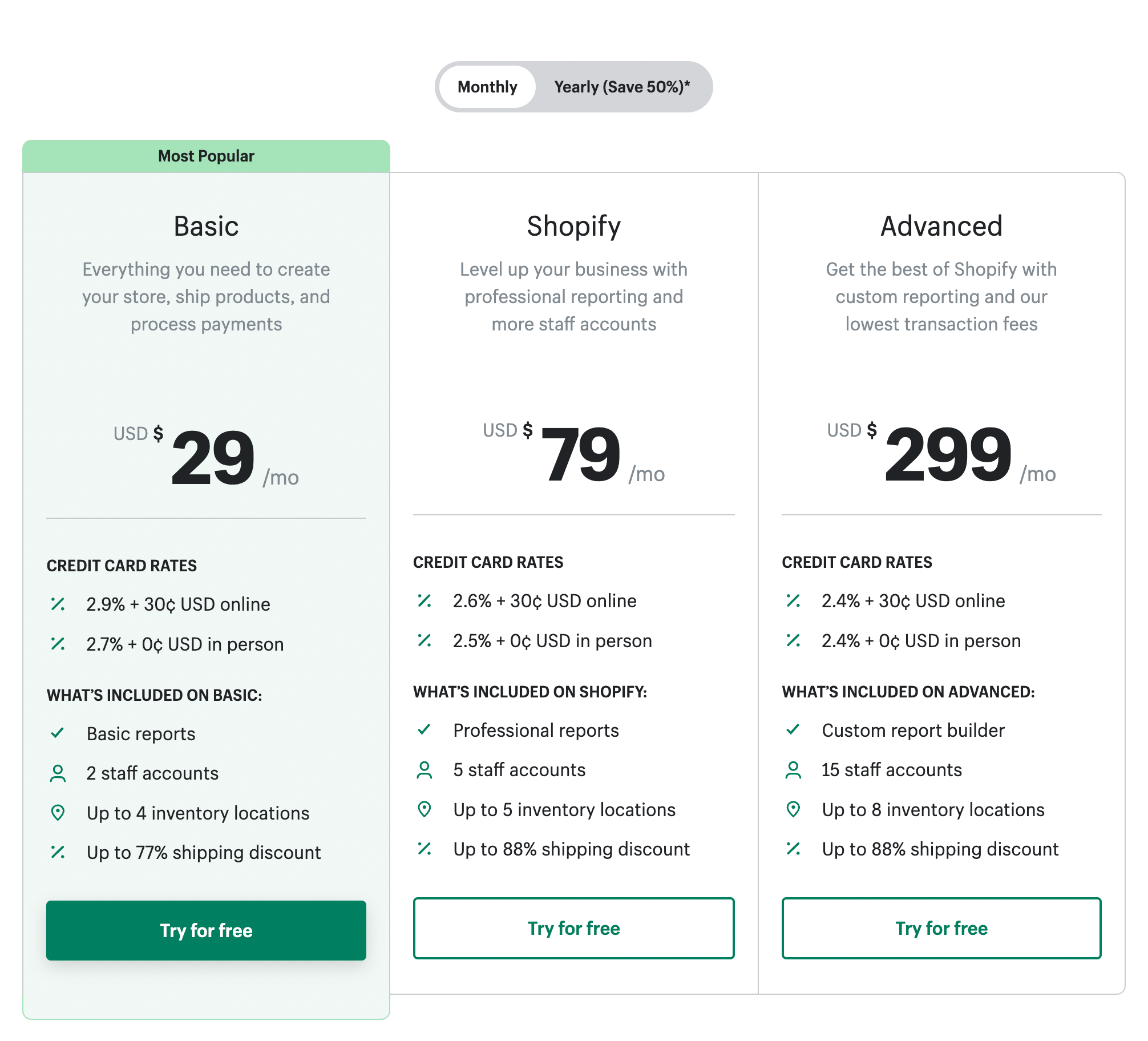
They also have a $5/month plan starter plan. But you will have to upgrade to get even the basic features. They also have a $2000/month plan for high-volume ecommerce stores.

Swell Pricing
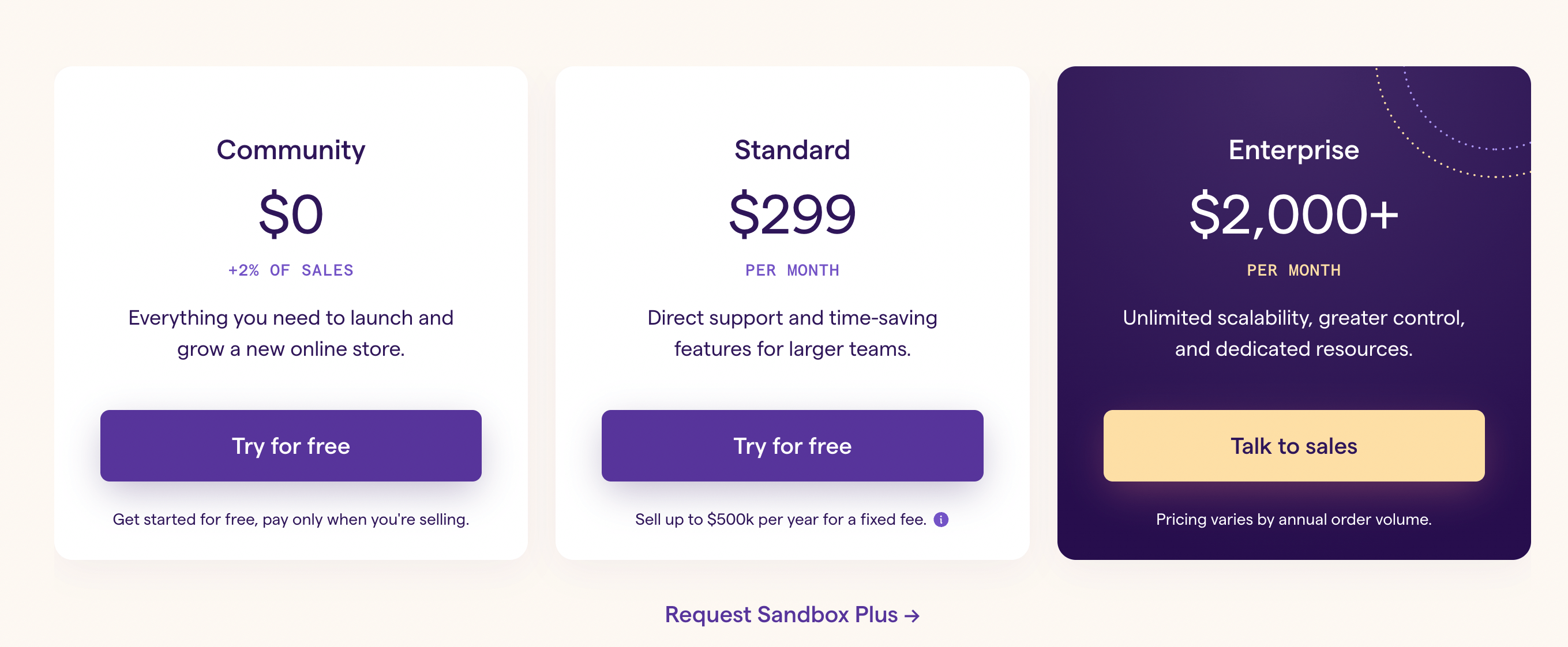
It is interesting to see that both Shopify Plus, and Swell's Enterprise offering are both are $2000/month.
I am unable to see the benefits of Swell with regards to pricing in this regard. Also, if your needs are simple, and you dont need extra customizations, Shopify's Shopify or Advanced plan maybe better suited for you.
Shopify vs Swell - Which has the better admin?
Below is a comparison between Shopify's and Swell's product admin pages. On the left is Swell, and on the right is Shopify.
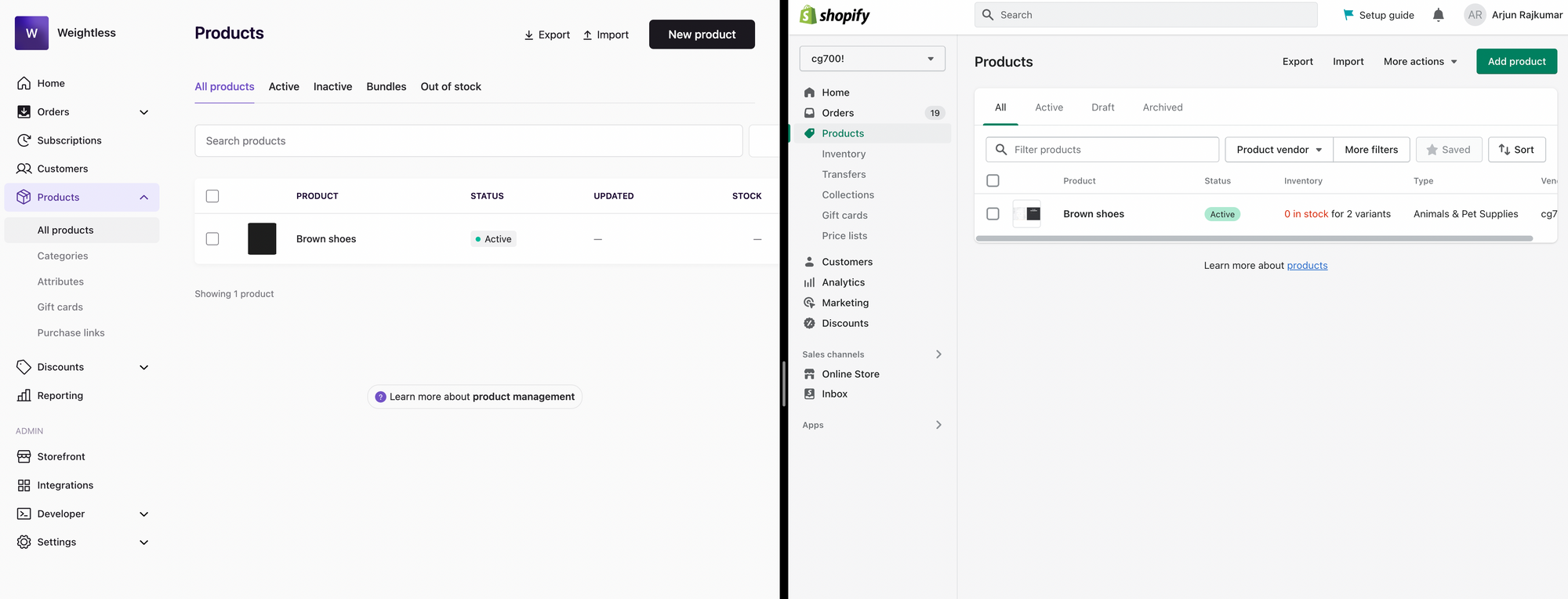
Both of them are really good and it is hard to find any notable differences between the two. However, on the product pages, on thing I noticed is how Swell allows you setup subscriptions really easily by choosing between standard or subscription based pricing, out of the box. With Shopify, you would have to integrate with a third-party app, to get the same features.
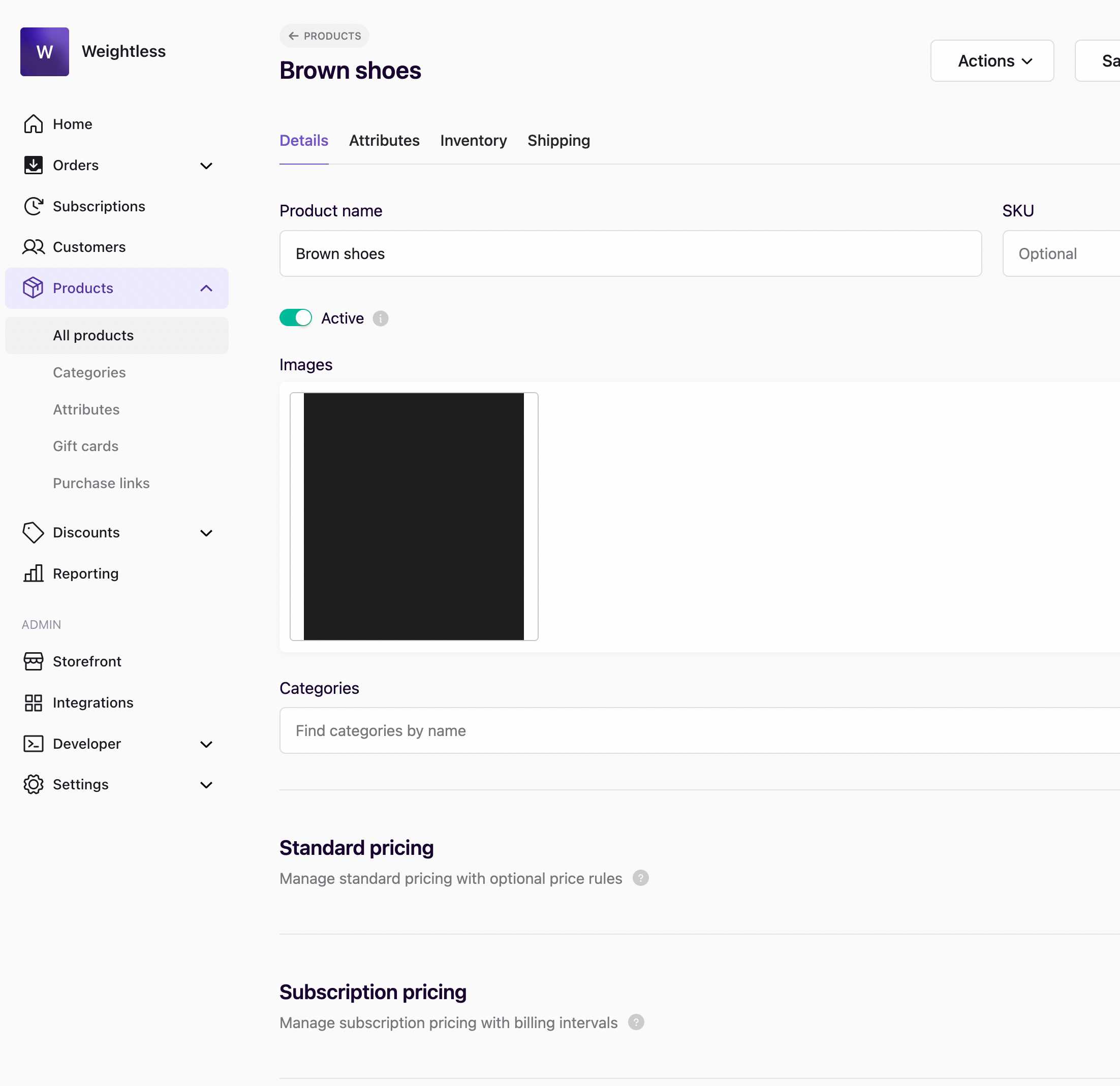
Conclusion
Swell Ecommerce is a new player in this space, and I am impressed with their offering - but for most people and businesses, I would suggest that you go with Shopify, and go with their out of the box standard plans (Shopify or Advanced). It is easier and will be faster to setup and get your store running quickly.
Once you reach a stage where you need more customizations - then you have to choose between something like Shopify Plus and Swell? If Swell had a better third-part app store, better reporting, they could really compete well with Shopify - but right now in 2022 for majority of the use cases, Shopify is the winner.
One thing I was disappointed with Swell is that they dont provide blogging out of the box. If you need to setup a blog, you have to build it out yourself. And this is not possible for 99% of the e-commerce stores.